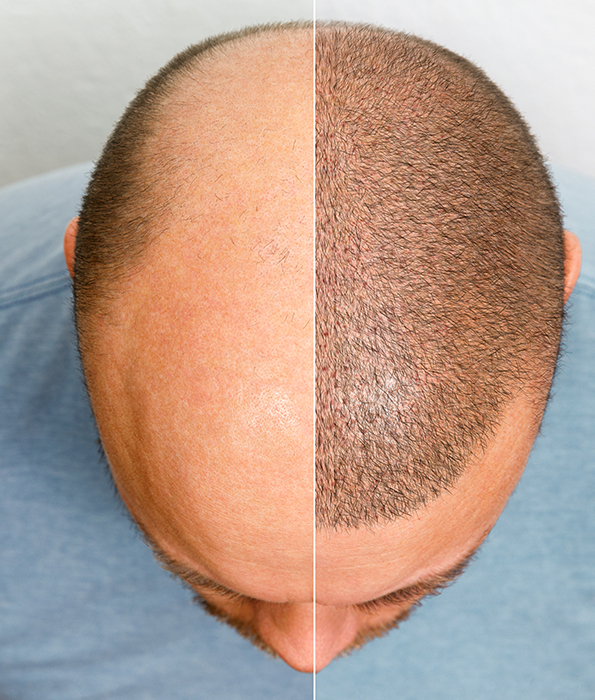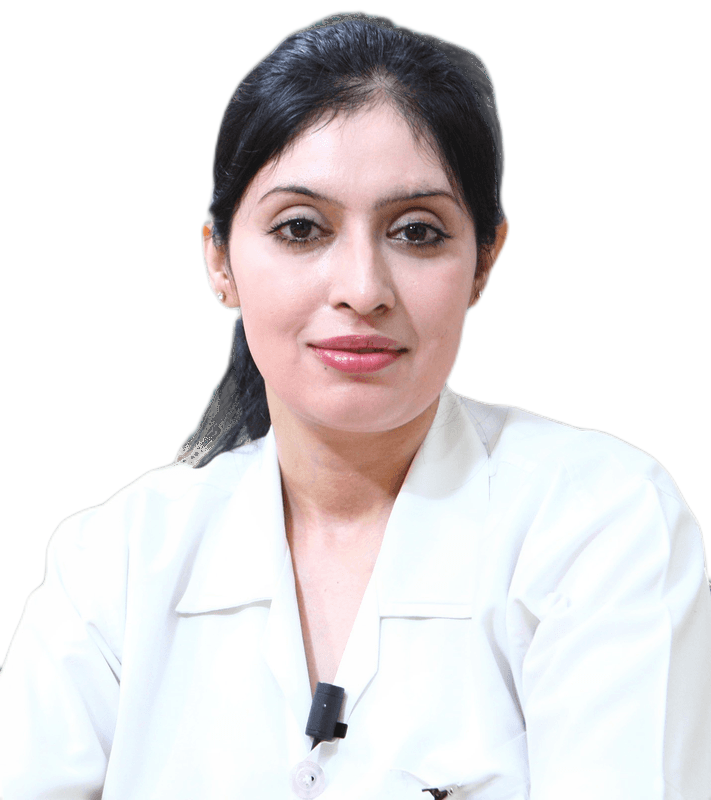WHAT WE TREAT
DISCOVER
SHOP ALL
Hair Regrowth

Process of Hair Regrowth
Hair regrowth treatments awaken the follicles to grasp the necessary nutrients and oxygen. Skin cells within the follicles commence producing keratin to help them multiply and mature. Meantime, the hair shaft extends and goes through a strengthening phase. Ultimately, thick and strong strands of hair are seen.
Facts to Consider While Undergoing Hair Regrowth Treatment
Have clarity about the root cause of your hair loss, consult an experienced hair specialist about your condition, keep patience as its a slow, gradual process, and pick a treatment consisting of alterations on different levels like modern solutions, dietary support, lifestyle changes, etc., go for a healthy diet, practice self-pampering and destress for healthier growth.
Precautions from Re-Occurrence of Hair Loss
Avoid using products with sulphates and parabens, include herbal ingredients like aloe vera, coconut oil, green tea extract, etc. in your routine, say no to high-heat hair styling tools, and maintain a diet that improves your hair quality by incorporating vitamins, minerals and proteins are the precautions you can take for hair loss.
How Common is it?
55%
of men experience some degree of hair loss affecting hair regrowth
31%
of women are affected with restricted hair regrowth due to hair thinning
24.8%
of Indians go through confined hair regrowth due to excessive stress
9%
of the Indian population goes through alopecia areata hindering regrowth
Want to find out more? We worked with our doctors to create this Ultimate Guide to ED
Your personalized Treatment

Our Medical Board
Case Studies
FAQ

I suffer from hair loss. Is it even possible to regrow hair?
Regrowing hair is indeed possible for many individuals, but the outcome can vary depending on several factors. It is advisable to consult a healthcare professional or a dermatologist who specializes in hair loss to evaluate your specific condition and recommend suitable treatment options. While some causes of hair loss, such as genetic factors, may limit the potential for full regrowth, various treatments and approaches can help improve the condition. Medications like minoxidil and finasteride are among the options available. However, the effectiveness and success of these treatments depend on individual factors and the severity of hair loss.
How long does it take to see results with hair regrowth treatments?
The timeline for visible results with hair regrowth treatments can vary depending on the treatment method, individual factors, and the severity of hair loss. It may take several months to a year or longer to notice significant improvements.
Can stress affect hair regrowth?
Undoubtedly, the impact of stress on hair loss and its interference with the regrowth process cannot be overlooked. It is crucial to effectively manage stress to foster an environment that supports healthy hair growth. Embracing stress management techniques such as incorporating regular exercise, practising meditation, and engaging in relaxation exercises can have a holistic effect on well-being and profoundly influence the health of one's hair.
Are there any natural remedies for hair regrowth?
Although natural remedies such as herbal supplements, essential oils, and scalp massages are frequently employed, their efficacy can vary, and scientific support may be limited. Seeking guidance from a healthcare professional is recommended to ensure appropriate advice and assistance.
Hair Regrowth: Process, Facts, and Prevention of Hair Loss
What is Hair Regrowth?
Hair regrowth refers to the process of hair growing again from the site where fully grown hair existed and it came off due to weakness or external pressure. Hair is a major extension of our skin and has abundant keratin bundled together. Hair follows a complete cycle before it grows back. Hair regrowth is important for recovering the deficiency of hair due to hair fall. Hair loss affects those whose hair sheds more frequently than it grows. Age groups and genders may have different hair loss trends. Both the scalp and other body areas are susceptible to hair loss.Process of Hair Regrowth
The hair before developing into a complete shape undergoes a complete cycle of even. It mainly comprises three phases that follow as:- Anagen
- Catagen
- Telogen
Why is Hair Regrowth Important?
Hair regrowth is important for several reasons. Hair greatly impacts your physical appearance and puts an influence on your self-esteem and confidence. Anything happening to your hair can greatly cause emotional distress and self consciousness. Hair fall can occur due to certain medications, medical conditions, genetics and various other factors. Additionally, the external environment can also influence hair fall and growth. Just like skin being a protective layer, hair are extensions of the skin and serve to be the protective layer as well. It protects the scalp from UV radiations, just, cold, allergens and pollution. It further controls and regulates the inside body temperature to maintain a steady state of homeostasis. The hair does so by providing insulation and preventing heat loss. Hair not only acts as a sensory organ to sense and detect any external feel, touch and pleasure. Hair and their styles also play an important part in cultural norms and taboos. History can depict how hair influences the religious beliefs of a person. Hair can enhance cultural beauty and youthfulness. A fully grown hairdo symbolizes rich health, attractiveness and wealth. Hair regrowth is important for individuals who have experienced hair loss due to medical conditions such as alopecia due to genetics and side effects of cancer treatments. Restoring hair growth can significantly improve their quality of life, boost their self-confidence, and help them feel more like themselves again. Overall, as hair impacts our appearance, protection, sensory perception, social interactions, and overall self-image, hair regrowth is important for both physical and emotional well-being. Maintaining good hair is important to maintain our appearance, protection, sensory perception, social interactions, and overall self-image.How Common is Hair Loss?
In India, issues with hair fall and hair loss are fairly prevalent. In India, beyond the age of 35, and as they become older, over 62% of people start losing their hair. Furthermore, male pattern baldness and female pattern baldness are so prevalent that androgenic alopecia affects up to 94% of those who have hair loss. Androgen alopecia affects over 59% of Indian men over the age of 50, which is substantially higher than the rate for the male population as a whole. Stress brought on by the difficulties we confront in our social lives is another factor that adds significantly to hair loss.Facts Related to Hair Regrowth
Almost 25 percent of India suffer from hair loss due to extensive stress. Here are some common facts about hair regrowth:- All of the hair strands go through the three cycles individually and therefore the length of a number of strands vary in terms of length and viability.
- As much as 100 strands of hair fall out everyday which is very common. The hair loss occurs when the regrowth is slower than its rate of falling out.
- There are a number of factors that influence the hair growth of an individual. The factors include age, gender, overall health, medications the person is using (if any) and external environment.
- Hair is made of a protein named as keratin. The appearance and strength of hair majorly depends on genetics and can travel through genes.
Hair Regrowth Treatment
Your doctor can prescribe you medications to manage your sickness, which will also treat the issue if medications or hormone imbalances are the reason for your hair loss. The majority of hair regrowth treatment are designed to address both male and female pattern baldness. Among the therapy techniques are: Medicaments: One can search for medications that are causing hair loss and, in some situations, look for alternatives whose side effects don't result in hair loss. There are several easily accessible drugs on the market that promote hair growth and stop hair thinning. Another option for treating hair loss is to take vitamins and nutrient-rich supplements. Hair Transplant: After undergoing medical treatments, patients who are unable to regrow hair may benefit from a hair transplant. It involves a technique in which the provider of the service surgically places each and every hair for scalp treatment for hair growth. The doctor typically transplants hair from areas of your body where it is abundant into areas where it is thin. Platelet-rich plasma therapy is referred to as PRP therapy. A portion of your blood fluid will be removed from your body during a physical, and the plasma portion of it will be separated. The plasma is then injected into the region where hair is thinning after they position the needle over your scalp. This procedure has been demonstrated to lessen hair loss from the scalp and fasten hair growth.Prophylaxis of Hair Loss
To stop hair loss and the distress that comes with it, preventive hair growth treatment for hair loss can be done. One can take a number of important precautions, such as:- Promoting a wholesome, vitamin- and nutrient-rich diet that stimulates hair development and helps to regrow hair.
- Taking care of bodily or mental stress.
- Managing metabolic and hormonal illnesses and pursuing full recovery from them.
- Avoid hairstyles that call for a lot of hair-pulling.
- The time you go outside, covering your hair.
- Applying essential oils and using quality shampoos can help prevent hair loss brought on by pollutants and the environment.
2023 nirvasa.com








